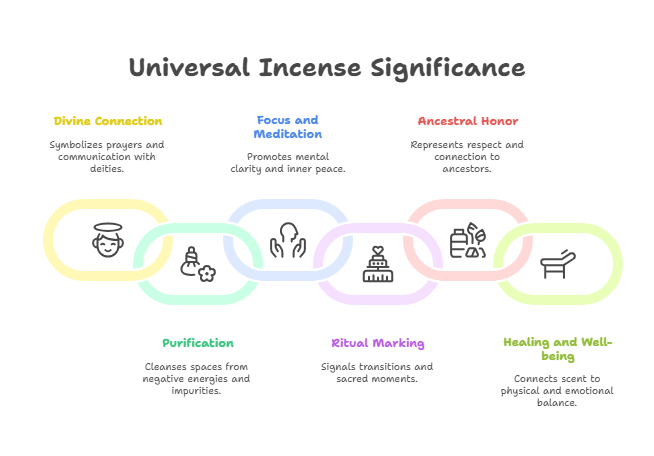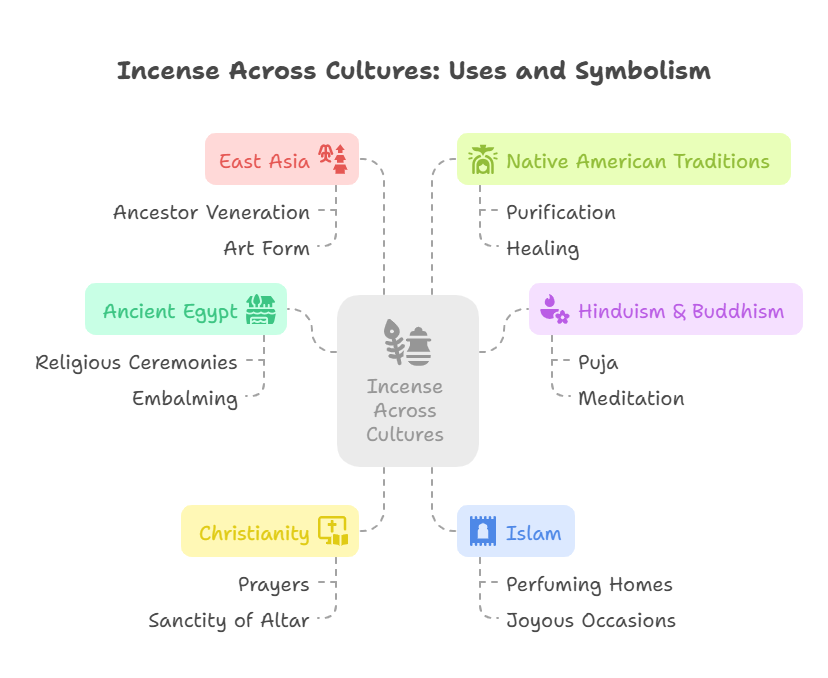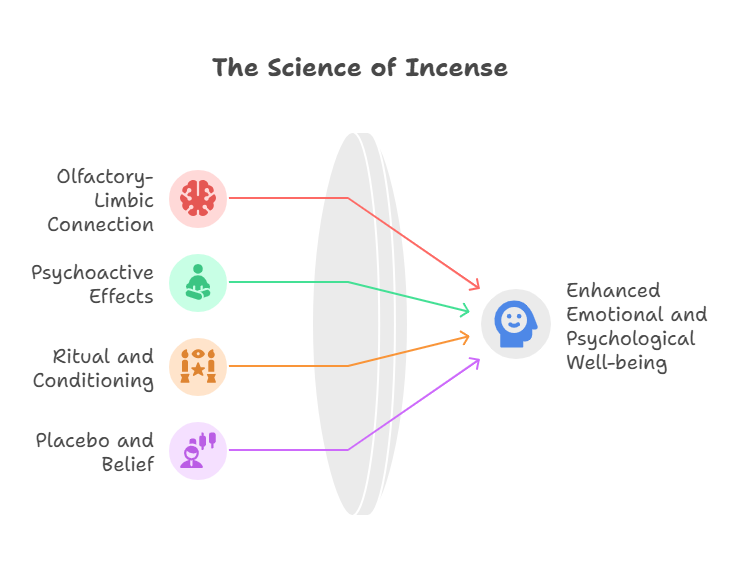|

For millennia, a wisp of fragrant smoke has curled upwards, carrying prayers, purifying spaces, and connecting humanity to realms beyond the tangible. Incense is far more than just a pleasant aroma; it’s a universal language of the spirit, a cultural cornerstone, and a sensory experience steeped in profound meaning. Whether you seek spiritual connection, mindful calm, or simply to enhance your environment, understanding the incense meaning unlocks a deeper appreciation for this ancient practice. And for those in Singapore seeking authentic, quality incense, your journey into this fragrant world begins here.
|
|
BEYOND AROMA: THE UNIVERSAL INCENSE MEANING
At its most fundamental level, incense refers to aromatic biotic materials (like resins, woods, spices, and essential oils) that release fragrant smoke when burned. But its significance transcends this simple definition. Across virtually every continent and civilization, incense has held sacred and symbolic roles:
-
A Bridge to the Divine: The rising smoke has universally symbolized prayers, offerings, and communication ascending to deities, ancestors, or the spirit world. In temples, churches, mosques, and home altars, incense creates a sacred atmosphere, marking the space as holy and inviting divine presence. The incense meaning here is deeply intertwined with devotion and transcendence.
-
Purification and Cleansing: Smoke has long been associated with driving away negative energies, evil spirits, and impurities – both physical and spiritual. Rituals often begin with "smudging" or censing a space to cleanse it, preparing the ground for sacred work or healing. This purification aspect is a core part of the incense meaning in traditions like Native American smudging (using sage, sweetgrass) and Japanese kōdō (the Way of Incense).
-
Focus and Meditation: The rhythmic act of lighting incense, observing the smoke, and inhaling the scent naturally draws the mind inward. Specific scents like sandalwood or frankincense are renowned for promoting mental clarity, deepening concentration, and facilitating meditation. This incense meaning centers on mindfulness and inner peace.
-
Ceremony and Ritual: Incense marks significant moments – births, marriages, deaths, seasonal changes, religious festivals. Its scent becomes a powerful sensory anchor for memory and tradition, signaling the transition from the mundane to the sacred. The incense meaning in ritual is one of consecration and marking sacred time.
-
Honoring Ancestors: In many cultures, particularly across Asia (like Chinese, Vietnamese, and Korean traditions), burning incense at ancestral altars is a fundamental act of filial piety, remembrance, and offering sustenance to departed loved ones. The incense meaning here is one of lineage, respect, and connection across generations.
-
Healing and Well-being: While distinct from modern medicine, traditional systems like Ayurveda and Traditional Chinese Medicine (TCM) have long incorporated specific incense aromas for their perceived therapeutic properties – calming the nervous system (lavender, chamomile), uplifting mood (citrus, rose), or clearing congestion (eucalyptus, camphor). This holistic incense meaning connects scent to physical and emotional balance.
|
|
A FRAGRANT TAPESTRY: INCENSE ACROSS CULTURES 
The incense meaning manifests uniquely within different cultural contexts:
-
Ancient Egypt: Used extensively in religious ceremonies (honoring Ra, Osiris), embalming (myrrh), and daily life. Kyphi was a famous complex blend. (Source: Manniche, L. Sacred Luxuries: Fragrance, Aromatherapy, and Cosmetics in Ancient Egypt).
-
Hinduism & Buddhism: Integral to puja (worship), meditation, and temple rituals. Sandalwood, agarwood (oud), and floral incenses like jasmine and lotus are highly revered. The smoke symbolizes the transformation of the material into the spiritual. (Reference: The Rig Veda mentions soma and other ritual substances; Encyclopaedia Britannica - Incense in World Religions).
-
Christianity: Used since ancient times (frankincense and myrrh were gifts to the infant Jesus). Symbolizes prayers rising to heaven and the sanctity of the altar. Prominent in Catholic, Eastern Orthodox, and some Anglican/Lutheran traditions. (Source: The Bible, Matthew 2:11; Catholic Encyclopedia - Liturgical Use of Incense).
-
Islam: While not universally practiced, the use of fragrant woods like oud (bakhoor) is popular, especially in the Arabian Peninsula, for perfuming homes and clothing, often linked to hospitality and creating a pleasant atmosphere. It can also mark joyous occasions. (Reference: Al-Ghazali's writings on manners and customs).
-
East Asia:
-
China: Central to ancestor veneration, Taoist rituals, and Buddhist practices. Often uses joss sticks (thin bamboo sticks coated with paste and fragrant powder). Sandalwood and agarwood are prized. (Source: Paper Gods: The Worship of Stelae and Scrolls in China).
-
Japan: Elevated to an art form (kōdō), focusing on appreciating subtle, natural scents in a meditative context. Uses high-quality kneaded incense (nerikō) and wood chips (aloeswood/kyara). (Source: Morita, K. The Book of Incense: Enjoying the Traditional Art of Japanese Scents).
-
Tibet: Uses potent, earthy blends often containing juniper, rhododendron, and medicinal herbs for purification, offerings, and driving away obstacles.
-
Native American Traditions: Sage (white sage), cedar, sweetgrass, and tobacco are sacred medicines used in smudging ceremonies for purification, prayer, and healing. The incense meaning is deeply connected to the land and spirit. (Respectful Note: These are closed cultural practices; non-Natives should learn respectfully from authentic sources if invited, not appropriate casually).
|
|
THE SCIENCE BEHIND THE SCENT: WHY INCENSE AFFECTS US
The profound incense meaning isn't just spiritual or cultural; it has a basis in our biology:
-
The Olfactory-Limbic Connection: Our sense of smell is directly wired to the limbic system, the brain's center for emotion, memory, and behavior. A specific scent can instantly evoke powerful memories or alter mood states. Incense leverages this primal pathway. (Source: Harvard Medical School - Smell and Taste: Spice of Life).
-
Psychoactive Effects (Subtle): While not intoxicating like drugs, certain incense components (like frankincense resin) contain compounds (incensole acetate) studied for potential anti-anxiety and anti-depressant effects via interaction with TRPV3 ion channels in the brain. (Reference: Moussaieff et al., Incensole Acetate, an Incense Component, Elicits Psychoactivity by Activating TRPV3 Channels in the Brain, The FASEB Journal).
-
Ritual and Conditioning: The consistent use of incense in specific contexts (meditation, prayer, relaxation) creates a powerful psychological association. Lighting it becomes a signal to the brain to shift state – to calm down, focus, or enter a reverent mindset. This reinforces the incense meaning personally.
-
Placebo and Belief: The deeply ingrained cultural and spiritual significance of incense contributes to its perceived effects through the placebo mechanism. Believing in its power to purify or connect enhances the experience.
|
|
LIGHT YOUR INTENTION: EMBRACE THE JOURNEY

Understanding the incense meaning transforms it from a simple air freshener into a powerful tool for spiritual connection, mindful living, and cultural appreciation. It’s an invitation to engage your senses, quiet your mind, and connect with something larger than yourself.
Whether you seek the deep serenity of sandalwood for meditation, the uplifting citrus for your workspace, the sacred frankincense for prayer, or traditional joss sticks to honor your ancestors, let your choice be intentional. Seek quality that honors the tradition.
|
|
Begin your fragrant journey with authentic incense from Singapore's trusted source. Explore our curated collection and discover the profound difference quality makes: skgtradingsg.com
Let the sacred smoke rise, carrying your intentions and connecting you to the timeless essence of incense.
|









